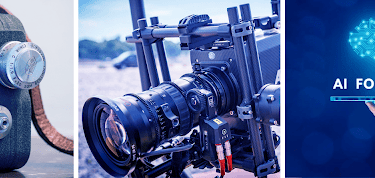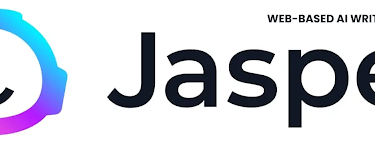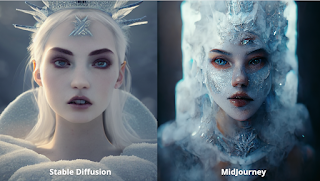Cinematic Revolution: Exploring AI's Impact on Filmmaking
Step into the future of filmmaking with our blog, where we uncover the profound impact of Artificial Intelligence on every facet of the industry. From script to screen, we explore how AI is reshaping the creative process, accelerating production, and fueling innovative storytelling. Join us on this cinematic journey, embracing AI as a powerful ally rather than a threat, as we unveil the transformative possibilities in the world of filmmaking.
TRENDS & INSIGHTS
Samuel Harmon
10/17/20234 min read


A Progressive Industry
The landscape of film-making has changed drastically over the last 20-30 years. In the 1990s we had the invention of the digital camera and by the 2000s main stream filmmakers across the world adopted the digital camera for mainstream video production. Today, AI and machine learning are not only speeding up the creative process, but creatives are getting excited about the many new ways developers are applying them to create workflows. This post is going to highlight how it is being used in film production and tv today as well as how you can speed up and improve your existing content development pipeline. We will take a look at the benefits of AI and the integral role it now plays and will play in each stage of the filmmaking process.
The Benefits of Using Artificial Intelligence
AI has changed the way filmmakers approach the medium. All aspects of the creative process from pre-production to production to post-production benefit from the utilization of AI-driven technologies. It specifically helps filmmakers create bigger and more immersive stories. Large-scale projects can be created more quickly while we estimate production costs to stay the same more work as a whole can be accomplished overall leading to larger and more impressive films. The faster turnaround time helps ideas move more quickly from the script to the screen allowing more time and energy to be put into planning and capturing more visually-stunning shots.


Jasper AI Writing Assistant Tool
AI In Pre-Production
Online AI resources like Jasper can help a director create the backbone of their script and even run with an initial idea to help writers brainstorm and organically evolve their writing. This is due to the large amounts of data the AI model has been fed to generate the model. Then through complex algorithms, the AI can formulate a unique script. The way it delivers it can be highly customized it can write in a variety of styles, voices, and paces all while adhering to proper spelling and grammar.


Midjourney vs. Stable Diffusion
AI can be used to conduct research for a film, find potential actors based on popular characters, and even help in location scouting. We are also seeing the rise of AI image generators making it possible to generate original concept art in a variety of inspired art styles. AI tools like Midjourney and Stable Diffusion are just a couple of the art generators you can subscribe to generate art. You will need to learn and understand how to prompt AI through text-to-image generation. Think of it like as though the AI is a Forensic Sketch Artist and you are the witness. The more descriptive and detailed you are to the AI, the better the AI can take that information and reference key points within the data set to pull information and effectively construct the image. Therefore, the concept art you generate is only as good as the prompt you engineer. Additionally, if you are an existing artist it helps you have a starting point allowing you to start with a pre-populated Canvas, or if you are a compositor, it allows you to create an amazing series of images of masterfully composite them together using an image compositing tool.
This is just scratching the surface of innovation in the film industry. Visionary Developers are finding new ways for how this AI can speed up the time-consuming and mundane tasks of the creative process leading to faster turnaround and ultimately the completion of more exciting and polished entertainment.
AI In Production
The time is not far off that AI will be able to produce video at the push of a button. If it can produce images, why can it not produce a series of images to make a polished scene as beautiful and artistic as CGI, matte paintings, and miniature sets? Today Unreal Engine 4 is being mixed with Volumetric sets to produce shows like Star Wars: The Mandalorian. The engines mixed with a background comprised of mini LCD screens create a dynamic environment. The result is a cohesive process that allows the camera to move freely and the set moves with realistic paralyzing. This also allows the lighting to change dynamically as the light produced by the volumetric set accurately casts light on the subject on stage. We are not far off from the production process having a significant amount of work generated using AI. Soon, only shots with spoken dialog that require the actor's presence will take up a significant amount of the time and resources required for production.
The volumetric stage for "Star Wars: The Mandalorian"


AI In Post-Production
Many tools are adding machine learning and AI to speed up the processes that before were either impossible or extremely time-consuming. AI can enhance visual effects in films through the use of machine learning algorithms which are trained to recognize key features and objects in a scene to help professionals more quickly track and add objects into a scene. 3D camera tracks, rotoscoping, and facial recognition trackers are just a few of the ways AI is being introduced into the post-production work processes.
Overall, AI has a big role to play in the future of filmmaking. Many fear it and worry it will take away precious jobs, but there is a better way to look at it. With the advent of film, digital cameras, and computer-generated imagery we did see a transition that required professionals to take up new skills, stay informed, and be up to date with the trend of an ever-changing industry and the technology available. As with all previous advancements we have seen the ability to create is more accessible and easier than ever to learn and apply to any project. Ultimately this should result in more creative writing, producing, editing, and distribution of their work. We should see AI as more of a new tool to be used and further applied to filmmaking, and less as a threat to the creative industry.
